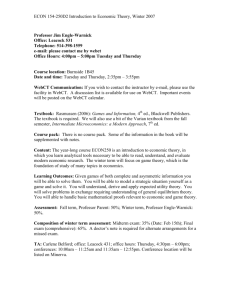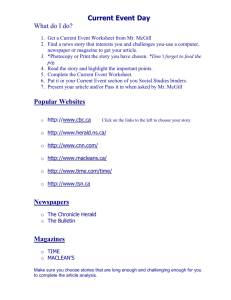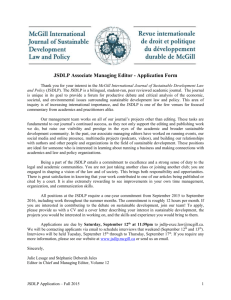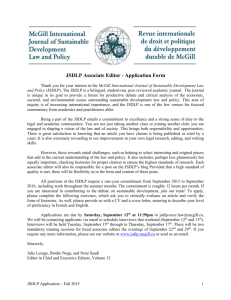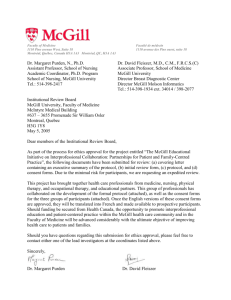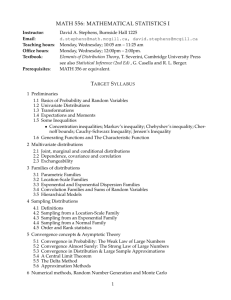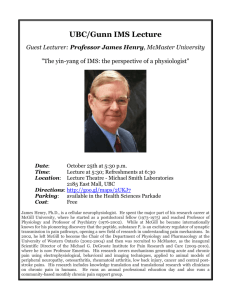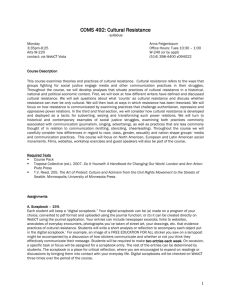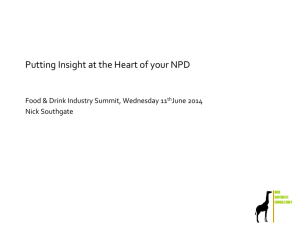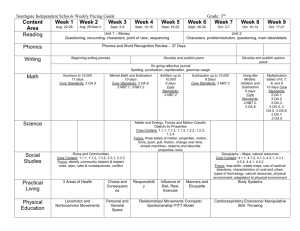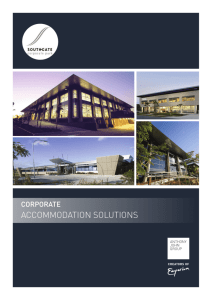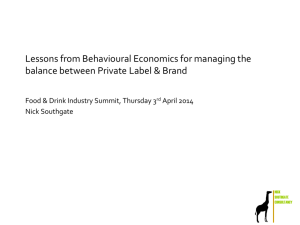"Religion and Science" (Kanaris)
advertisement
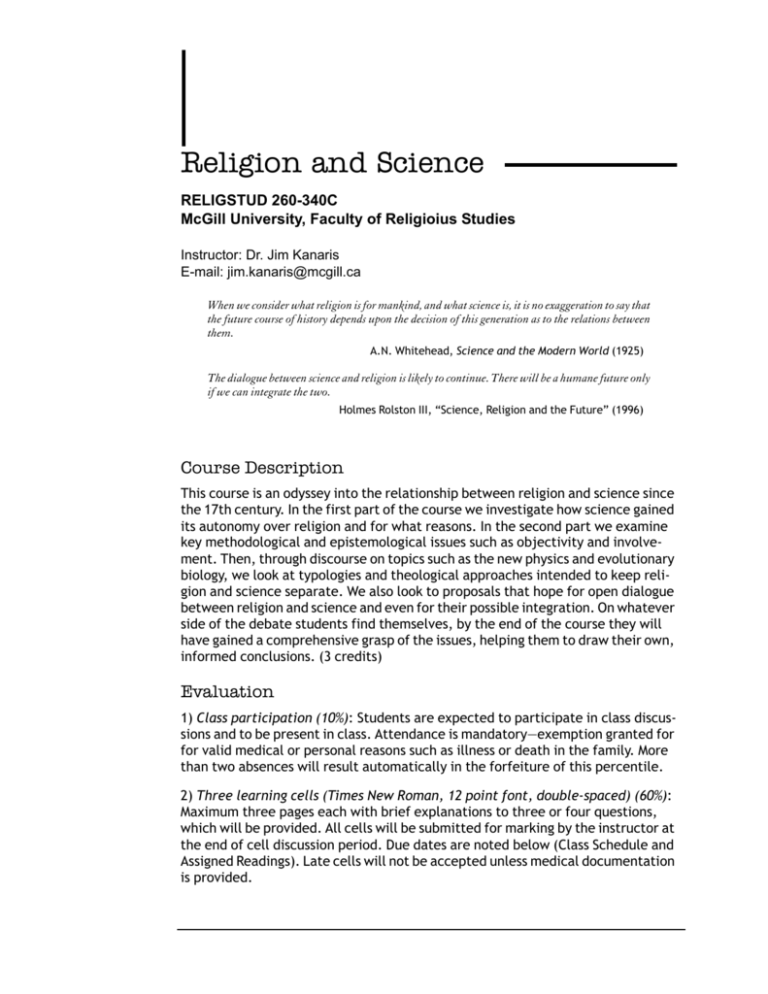
Religion and Science RELIGSTUD 260-340C McGill University, Faculty of Religioius Studies Instructor: Dr. Jim Kanaris E-mail: jim.kanaris@mcgill.ca When we consider what religion is for mankind, and what science is, it is no exaggeration to say that the future course of history depends upon the decision of this generation as to the relations between them. A.N. Whitehead, Science and the Modern World (1925) The dialogue between science and religion is likely to continue. There will be a humane future only if we can integrate the two. Holmes Rolston III, “Science, Religion and the Future” (1996) Course Description This course is an odyssey into the relationship between religion and science since the 17th century. In the first part of the course we investigate how science gained its autonomy over religion and for what reasons. In the second part we examine key methodological and epistemological issues such as objectivity and involvement. Then, through discourse on topics such as the new physics and evolutionary biology, we look at typologies and theological approaches intended to keep religion and science separate. We also look to proposals that hope for open dialogue between religion and science and even for their possible integration. On whatever side of the debate students find themselves, by the end of the course they will have gained a comprehensive grasp of the issues, helping them to draw their own, informed conclusions. (3 credits) Evaluation 1) Class participation (10%): Students are expected to participate in class discussions and to be present in class. Attendance is mandatory—exemption granted for for valid medical or personal reasons such as illness or death in the family. More than two absences will result automatically in the forfeiture of this percentile. 2) Three learning cells (Times New Roman, 12 point font, double-spaced) (60%): Maximum three pages each with brief explanations to three or four questions, which will be provided. All cells will be submitted for marking by the instructor at the end of cell discussion period. Due dates are noted below (Class Schedule and Assigned Readings). Late cells will not be accepted unless medical documentation is provided. 3) Research Paper (Times New Roman, 12 point font, double-spaced) (30%): Minimum eight pages (excluding bibliography). Students will choose a topic of their choice directly related to issues of science and religion, their relationship; topic is to be discussed with the instructor. Students may cover traditions other than the tradition featured in this course (i.e., the Judeo-Christian), which tends to predominate in the discussion today for various historical and philosophic reasons. Islam, Buddhism, and Daoism are among the more obvious choices. Attention to style is mandatory. Students are expected to follow at least the elements of style outlined in the “Faculty of Religious Studies Style Sheet.” This is available at the Faculty of Religious Studies and on the Faculty web site <ww2.mcgill.ca/religion/style.htm#style%20sheet>. Due date to be announced. Papers submitted after due date will have 3% per day deducted unless prior arrangements have been made with the instructor. Required Text Southgate, Christopher et al., eds. 1999. God, Humanity and the Cosmos: A Textbook in Science and Religion. Harrisburg, PA: Trinity Press International. Supplementary Reading Barbour, Ian G. 2000. When Science Meets Religion. New York: HarperCollins. ———. 1997. Religion and Science: Historical and Contemporary Issues. New York: HarperCollins. ———. 1990. Religion in an Age of Science: The Gifford Lectures 1989–1991, Volume 1. New York: HarperCollins. ———. 1966. Issues in Science and Religion. New York: Harper & Row, 1966. Peters, Ted, ed. 1998. Science and Theology: The New Consonance. Boulder, CO: Westview Press. Polkinghorne, John. 1991. Reason and Reality: The Relationship between Science and Theology. Philadelphia: Trinity Press International. Web Resources Course site: WebCT <webct3.mcgill.ca>: WebCT (Web Course Tools) is an on-line course management system. It allows instructors to create and manage Web-based or Webenhanced courses. Via WebCT students may access important course information, read recent announcements for their course, have real-time discussions with other class participants, keep track of their grades, and so on. It’s a vital education medium today. All McGill students are entitled to use WebCT and have, in 2 of 4 fact, been assigned a Global UserID based on their official McGill records. See attached handout for futher information and instructions on accessing WebCT. Related sites: Counterbalance <www.counterbalance.org> The Center for Theology and the Natural Sciences <www.ctns.org> Dialogue on Science, Ethics, & Religion <www.aaas.org/spp/dser/> Zygon Center for Religion and Science <zygoncenter.org/> The Talk.Origins Archive: Exploring the Creation/Evolution Controversy <www.talkorigins.org/> Class Schedule and Assigned Readings Part I: Historical Development May 1: Topic: Orientation 2: Topic: 17th Century Reading: Southgate 27-32; Barbour 1966, chapter 2 6: Topic: 7: Topic: 8: Topic: 17th Century (cont’d) 18th Century 19th Century Reading: Southgate 32-35; Barbour 1966, chapters 3 and 4 19th Century (cont’d) Part II: Methodological Issues 9: Topic: Typologies and Various Methods Reading: Southgate 3-27, 35-47 Topics for learning cell #1 announced 13: Learning cell #1 Discussion 14: Topic: Truth and Reason: Scientific Positivism Reading: Southgate 49-91 3 of 4 15: Topic: Theological Responses to Positivism 16: Topic: Philosophic Responses to Positivism Topics for learning cell #2 announced 20: Holiday Part III: Issues in the Physical and Life Sciences 21: Learning cell #2 Discussion 22: Topic: Religion and the New Physics Reading: Southgate 95-135 23: Topic: Religion and the New Physics (cont’d) Topics for learning cell #3 announced 27: Topic: Religion and Evolutionary Biology Reading: Southgate 137-71 28: Learning cell #3 Discussion 29: Topic: Religion and Evolutionary Biology (cont’d) 4 of 4
